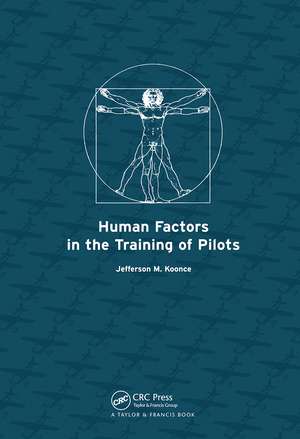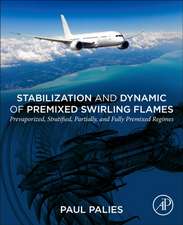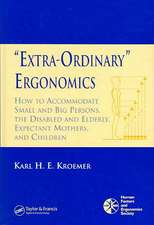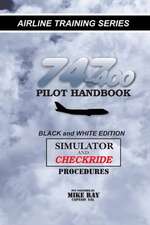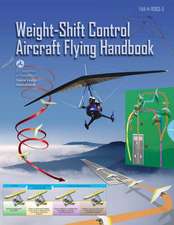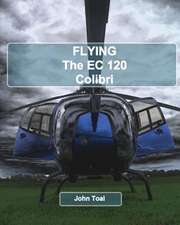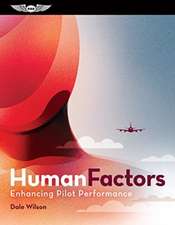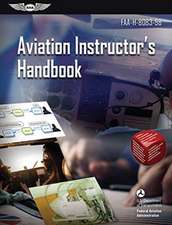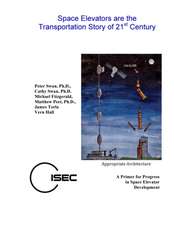Human Factors in the Training of Pilots
Autor Jefferson M. Koonceen Limba Engleză Hardback – 23 mai 2002
The author discusses principles of human factors, and how they can be utilized in pilot training and evaluation. With a conversational tone, he also relates anecdotes, jokes, and truisms collected during his time as a flight instructor. He takes a positive approach to the subject, focusing on safety and good practice rather than on accidents. While problem areas are acknowledged, and the book points out how certain problems may result in mishaps, the author avoids focusing on individual accidents.
Human Factors in the Training of Pilots is a must for pilots wanting to make a systematic study of the human factors issues behind safe flying, and for instructors or serious students needing an authoritative text.
Preț: 1279.51 lei
Preț vechi: 1560.37 lei
-18% Nou
Puncte Express: 1919
Preț estimativ în valută:
244.83€ • 255.62$ • 202.63£
244.83€ • 255.62$ • 202.63£
Carte tipărită la comandă
Livrare economică 05-19 aprilie
Preluare comenzi: 021 569.72.76
Specificații
ISBN-13: 9780415253604
ISBN-10: 0415253608
Pagini: 316
Dimensiuni: 156 x 234 x 20 mm
Greutate: 0.65 kg
Ediția:1
Editura: CRC Press
Colecția CRC Press
ISBN-10: 0415253608
Pagini: 316
Dimensiuni: 156 x 234 x 20 mm
Greutate: 0.65 kg
Ediția:1
Editura: CRC Press
Colecția CRC Press
Public țintă
ProfessionalRecenzii
"There are numerous books available which talk about human factors, many of which focus on flight and ground instruction for pilots, but we have not seen one that provides such in-depth study of the many factors influencing learning in this environment…Koonce uses plain language to defend the academic points in an understandable and reasonable manner. This allows even the novice aviation technical reader to agree to disagree with the human issues within the learning arena…The book is filled with valuable hints and tips that surely have been handed down by flight instructors through the ages. This book is a must-read for all professional flight instructors and definitely a should read for any aviation enthusiast."
-International Journal of Applied Aviation Studies, Vol. 4, No. 2, 2004
"There are other books on human factors in aviation, but few so practical or so readable as this one…[The author] takes a positive approach to the subject, emphasizing safety and good practice. While problem areas are acknowledged-and the book points out how certain problems may result in mishaps-it avoids focusing on individual accidents. The book is equally useful for the pilot wanting to make a systematic study of the human factors issues behind safe flying, as for the instructor or serious student needing an authoritative text."
-Bookmarks
-International Journal of Applied Aviation Studies, Vol. 4, No. 2, 2004
"There are other books on human factors in aviation, but few so practical or so readable as this one…[The author] takes a positive approach to the subject, emphasizing safety and good practice. While problem areas are acknowledged-and the book points out how certain problems may result in mishaps-it avoids focusing on individual accidents. The book is equally useful for the pilot wanting to make a systematic study of the human factors issues behind safe flying, as for the instructor or serious student needing an authoritative text."
-Bookmarks
Cuprins
List of illustrations, Foreword, Acknowledgments, PART I Human factors, PART II Applications and hints from the years, References, Index
Descriere
Drawing on his 44 years of pilot experience and 31 years as a professor of psychology and human factors engineering, the author addresses the questions of how to apply sound human factors principles to the training of pilots and to flying. He takes a positive approach to the subject, focusing on safety and good practice rather than on accidents. While problem areas are acknowledged, and the book points out how certain problems may result in mishaps, it avoids focusing on individual accidents. Human Factors in the Training of Pilots is an authoritative text for pilots wanting to make a systematic study of the human factors issues behind safe flying, as well as for instructors and students.
